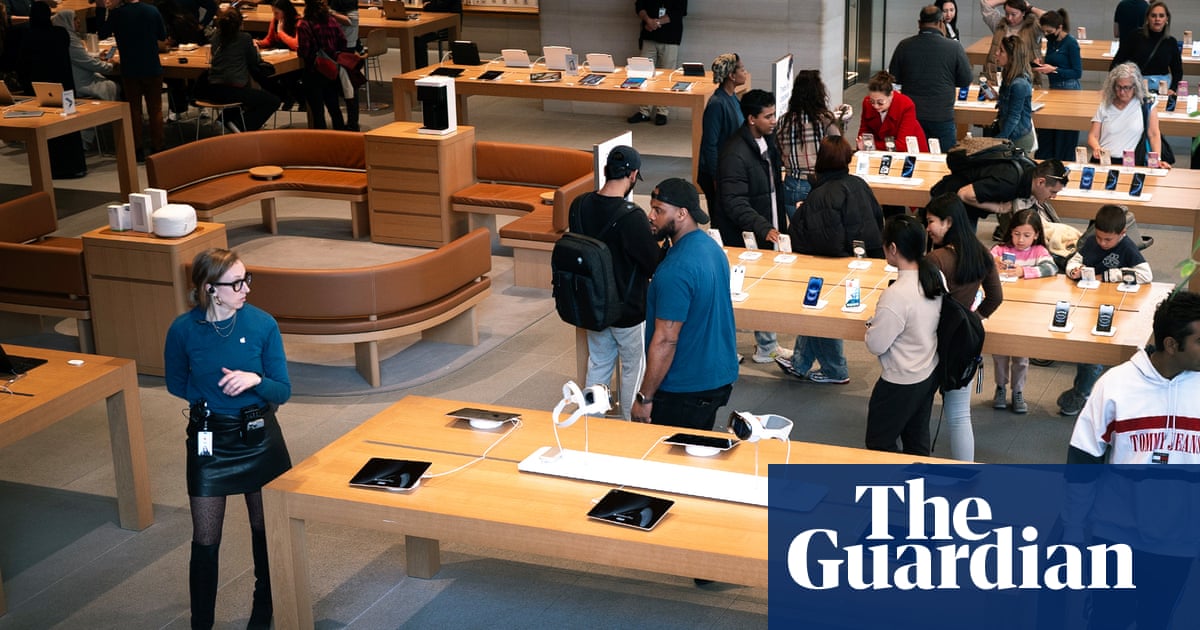Investors have their eyes onAppleas it prepares to report financial results of the second quarter of the fiscal year on Thursday. The tech giant has been working to calm nervous analysts afterDonald Trumplevied sweeping tariffs on countries around the world that are likely to complicate supply chains for consumer electronics. Since the beginning of the year, Apple’s stock has slumped 16%.
In anticipation of its earnings report, the company’s stock notched up slightly on Wednesday. Analysts arepredictinga positive quarter for Apple with an average revenue estimate of $94.56bn, up 4.2% over last year, and earnings of $1.62 per share, up 5.8%. The company, worth $3.2tn, has beaten Wall Street’s expectations for the previous four quarters.
The iPhone maker is heavily reliant on Chinese manufacturing for its phones, tablets and laptops. Days after Trump instituted soaring tariffs on China, at one pointas high as 245%, the president said he wouldmake an exceptionfor consumer electronics.
Apple’s CEO, Tim Cook, spoke to senior White House officials around this time, according to theWashington Post. It was after these conversations that Trump announced his exception for consumer electronics. Apple’s stock rose 7% in the days after the announcement.
However, it is unclear how lasting the reprieve may be. Howard Lutnick, the US commerce secretary, hascalled the exemption “temporary”, and even Trump later said on social media that there’s been no “exception”.
The president has repeatedly said he wants to see more manufacturing in the US. In February, he met with Cook to discuss investing in US manufacturing. “He’s going to start building,” Trump said after the meeting. “Very big numbers – you have to speak to him. I assume they’re going to announce it at some point.”
JP Morgan estimates costs would skyrocket for Apple if it moves production to the US, saying in a note this week that it could “drive a 30% price increase in the near-term, assuming a 20% tariff on China”. JP Morgan and other analysts have said Apple could continue to move more of its manufacturing to India, which only faces a 10% tariff.
Sign up toTechScape
A weekly dive in to how technology is shaping our lives
after newsletter promotion
Apple chartered jets toairlift some $2bn worth of iPhones from Indiato the US earlier this month to boost inventory in anticipation of price hikes from Trump’s tariffs and panic-buying by worried consumers. This comes as investors have expressed concerned about decreasing iPhone sales in China, the world’s biggest smartphone market. During its last earnings in January, Apple reported thatiPhone sales fellby 11.1% in China in the first quarter and missed Wall Street’s expectations for iPhone revenue.
In the short term, however, analysts say the tariff confusion could benefitApplewith people panic-buying its products in fear that prices will rise.“What remains to be seen in the longer term is how much of any increased cost will be passed on to consumers,” said Dipanjan Chatterjee, principal analyst for Forrester. “And if [consumers] will absorb these price increases without pulling back on demand for Apple products.”
